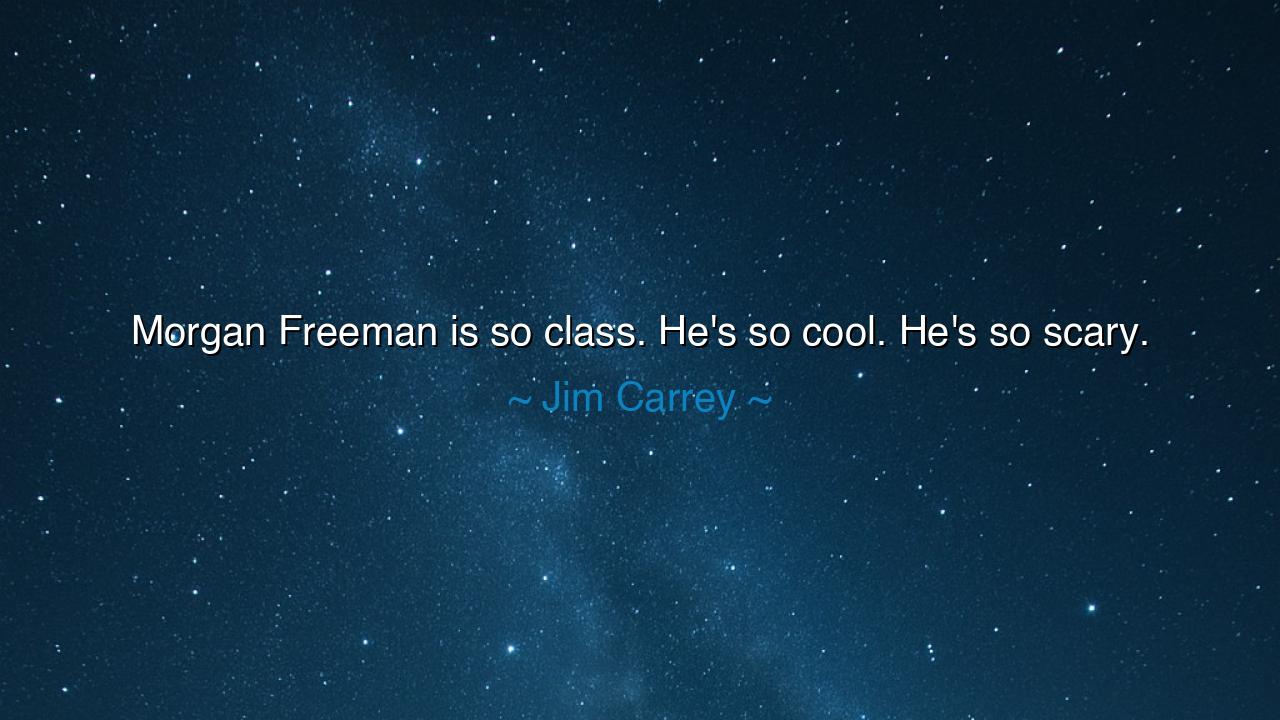
Morgan Freeman is so class. He's so cool. He's so scary.






In the words of Jim Carrey, "Morgan Freeman is so class. He's so cool. He's so scary." At first glance, these words might seem like a lighthearted expression of admiration, but beneath the surface lies a profound understanding of what it means to embody greatness. Morgan Freeman, with his deep voice, wise demeanor, and commanding presence, has become a figure that transcends the ordinary. He is not just an actor; he is a symbol of grace, wisdom, and mystery. In these few words, Carrey encapsulates the complexity of Freeman's persona—someone who exudes both elegance and an unsettling power, someone whose presence commands respect and contemplation.
In the ancient world, such figures were revered not just for their external achievements, but for the deep inner strength they projected. Consider the great orators of Greece, such as Demosthenes or Pericles, who spoke not only with authority but with a presence that could sway the hearts and minds of their audiences. They were not merely speaking words; they were embodying truth, commanding the very space around them. Morgan Freeman, much like these orators of old, does not just speak; he delivers wisdom in a way that resonates with the soul. There is power in his voice, a gravitas that transcends the boundaries of cinema and touches the very core of the human experience.
Freeman's coolness, as Carrey notes, lies in his ability to remain composed and dignified in every role he plays. His presence is not defined by flashy displays or overt bravado, but by the quiet authority that flows from him effortlessly. It is the kind of coolness that the ancients called arete, a word that referred to the highest form of excellence. In this, Freeman exemplifies the ideal of virtuous character, someone who does not seek to impress through superficial means but commands admiration through the sheer power of his presence. The Stoic philosophers, like Seneca, taught that true power comes from within—self-control, wisdom, and integrity are the qualities that make one truly strong. Freeman’s coolness is a reflection of this inner power, a power that does not need to be shouted, but is felt in every quiet word and measured action.
But there is another side to Freeman’s persona—the element of fear or intimidation that Carrey references. Freeman’s characters often carry an air of mystery, and in roles like God in Bruce Almighty or the wise mentor in The Shawshank Redemption, he is both revered and feared, as he holds knowledge and wisdom that can change lives. This balance of fear and respect is a reminder of the ancient understanding that true leaders often provoke both admiration and trepidation. Alexander the Great, despite his remarkable military victories, was feared by his enemies for the power he wielded and the ambition he displayed. His presence on the battlefield was not just one of strength but of commanding authority—the kind of presence that Freeman exudes in his roles.
In the realm of art, the power of mystery combined with respect is often what separates the ordinary from the extraordinary. Consider Michelangelo, the sculptor who breathed life into marble, or Shakespeare, whose words have resonated through centuries. Both of these figures left legacies not just because of their works, but because of the depth they imbued into every creation. Freeman’s work, much like theirs, is infused with a presence that lingers long after the performance has ended. He does not simply act; he becomes the embodiment of the truth within each role, bringing forth a weight that forces us to look deeper, to question more, and to confront the complexities of life itself.
The lesson that Carrey’s words teach us is the balance between humility and command. Freeman’s persona reminds us that true greatness is not found in the pursuit of fame or the need for validation, but in the quiet power of authenticity. To be truly great is to embody wisdom, to command respect, and to cultivate a presence that others cannot ignore. Yet, this power comes not through force, but through integrity, self-mastery, and the ability to inspire both admiration and awe. In this, Freeman teaches us that to be "cool" is not to follow fleeting trends, but to live in alignment with a deeper, more lasting truth.
So let us, like Morgan Freeman, strive to live with a quiet dignity and inner strength, embodying the timeless virtues of wisdom and composure. Let us not seek the shallow approval of others, but cultivate the kind of presence that speaks for itself—a presence that commands not just admiration, but deep respect. Like the great figures of the past, let us aim to leave a legacy that is not built on empty acclaim, but on the profound impact we have on the world around us. True greatness lies not in what we say, but in how we carry ourselves, and in the quiet, undeniable power of our presence.






AAdministratorAdministrator
Welcome, honored guests. Please leave a comment, we will respond soon